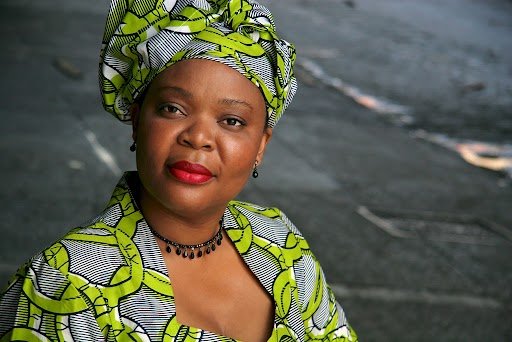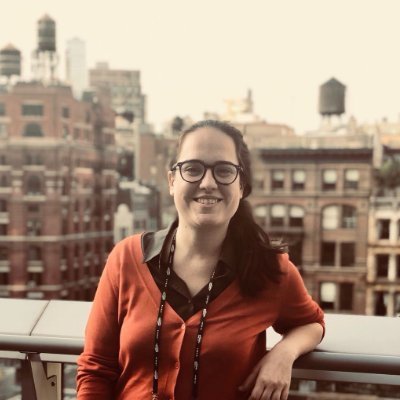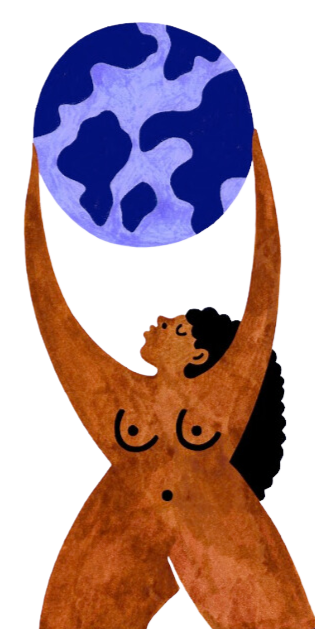What the World Will Become:
A podcast about the humans who dedicate their lives to building a more free and just world
New Season out now!
Welcome to What the World Will Become, a podcast about the humans who dedicate their lives to building a more free and just world. Over the course of this season, you’ll hear from women and gender non-conforming activists from around the world who are carving out spaces for creative resistance and new possibilities in the context of profound difficulty.
The title of this podcast is inspired by abolitionist scholar Ruth Wilson Gilmore, who reminded us that, “What the world will become already exists in fragments and pieces, experiments and possibilities.” Follow along to learn from those engaged in these ‘experiments and possibilities,’ whose work offers us a blueprint for how we might build a world that is free from violence.
Season 2 - In Spanish!
-

Welcome to Season 2: Cuidado Radical – Voces Feministas de América Latina
We are thrilled to announce the release of a Spanish-language mini season of What the World Will Become, a podcast that aims to uplift the feminist activists who are creatively organizing to build a more free and just world. This season is guest-hosted by two remarkable alumni of our IGLI Mexico City Institute last year: Estefanía Cubillos Nova and Cony Oviedo González.
Estefanía and Cony met each in Mexico City, amidst both of their human rights activism. They reconnected in Paraguay, where Cony is based, to record this podcast. Throughout the three episodes, they explore what self-care means for feminist activists who are fighting against violent systems, often in contexts of great insecurity. They explore what it means to protect ourselves and each other, bringing in incredible activists from across Latin America to share their own perspectives and expertise. -

Episode 1: Autocuidado, Amor y Sanación en América Latina
In this inaugural episode, Estefanía and Cony interview Atala Chávez, from Mexico, who shares that for women, self-care must emerge from love rather than demand. They then speak with Andrea Moreno, from Colombia, who highlights how ancestral self-care and popular research allow communities to heal after long periods of violence. Finally, they speak with Luzbeidy Monterrosa, an indigenous filmmaker from Colombia, about cinema and collective reflections, highlights the importance of rest in our work to build a more free world.
En este episodio inaugural, Estefanía y Cony entrevistan a Atala Chávez, de México, quien comparte que, para las mujeres, el autocuidado debe surgir del amor, no de la exigencia. Luego, conversan con Andrea Moreno, de Colombia. Andrea destaca cómo el autocuidado ancestral y la investigación popular permiten la sanación de comunidades tras largos períodos de violencia. Finalmente, conversaráj con Luzbeidy Monterrosa, cineasta indígena colombiana-venezolana sobre cine y reflexiones colectivas, destacando la importancia del descanso en nuestro trabajo para construir un mundo más libre.
-

Episode 2: Nutriendo Nuestros Cuerpos y Movimientos - Autocuidado Feminista en Acción
In this second episode, Estefanía and Cony interview Ana Zeto, from Guatemala, who explains feminist self-care in her indigenous worldview, which includes keeping the environment healthy, taking care of the rivers, and nourishing our bodies by eating nutritious food. Then, they speak with Elena Lorac from the Dominican Republic, who emphasizes the need for financing to expand restorative activist convenings like IGLI in Latin America and the world, suggesting that encounters of creativity and rest are essential for helping activists recharge emotionally as they pursue their critical work.
En este segundo episodio, Estefanía y Cony entrevistan a Ana Zeto, de Guatemala. Ana explica el autocuidado feminista según su cosmovisión indígena, que incluye mantener un medio ambiente sano, cuidar a los ríos, y nutrir nuestro cuerpo con alimentos nutritivos. Luego, hablarán con Elena Lorac, de la República Dominicana, quien enfatiza la necesidad del financiamiento para expandir encuentros de activismo restaurativo como IGLI en Latinoamérica y el mundo. Para Elena, los encuentros de creatividad y descanso son esenciales para ayudar a las activistas a recargar energías emocionales mientras realizan tan importante trabajo.
-

Episode 3: Uniendo Movimientos Feministas para Descanso, Sanación y Amor
In this third and final episode, we explore the importance of self-care for love, coexistence, and life in general. In addition, thanks insights from activists Isa Sousa, from Colombia, and Morena Herrera, from El Salvador, we discover how feminists across different movements can unify to rest, heal, and flourish. This episode concludes with Estefanía and Cony’s reflections, weaving together all of the lessons from these three episodes.
En este tercer y último episodio, nos enfocamos en la importancia del autocuidado para el amor, la convivencia y la vida en general. Además, gracias a las perspectivas de las activistas Isa Sousa, de Colombia, y Morena Herrera, de El Salvador, descubriremos cómo las feministas de diferentes movimientos pueden unirse para descansar, sanar y florecer. Este episodio concluye con las reflexiones de Estefanía y Cony, entrelazando las lecciones de los tres episodios.
Season 1
-

Championing Change and Peace - A Dialogue with Nobel Laureate Leymah Gbowee
As we grapple with a violent world, how do we tap into our collective humanity? In this special bonus episode from Season 1 of WWWB, Nobel Laureate Leymah Gbowee shares how her upbringing, where she was taught the significance of education and standing up for her beliefs, paved the way for her to become a beacon of hope and change. From her youth as a spirited high school senator to a globally recognized peace activist and 2011 Nobel Peace Prize laureate, she demonstrates the formidable power of the human spirit and the immense potential of women in championing human rights and equity. Together we journey through the cataclysmic impacts of war, with unique emphasis on the pivotal role of women in building peace. We discuss the Second Liberian Civil War, the displacement it wrought, and the residual trauma that survivors grapple with. Despite these daunting realities, the spotlight remains on the unyielding courage of Leymah and the women who stood by her, protesting against the war - a testament to the potency of active nonviolence in instigating meaningful change.
You can find the full event, hosted with World Denver, here.
-

Exploring War, Women's Rights, and the Power of Poetry with Choman Hardi
How can activism play out on the page, as well as on the ground? Can poetry give us a deeper understanding of the horrors of war and genocide? These thought-provoking questions rest at the core of our conversation with Choman Hardi, a respected educator, poet, and scholar hailing from the Kurdistan region of Iraq. We journey through Choman's experiences of displacement and discuss the vital role of poetry in humanizing tragic stories that are often silenced or overlooked. We also explore the struggles, triumphs, and remarkable resilience of Kurdish women navigating through a society marked by patriarchal norms. Choman's writing brings into focus the dynamic women's rights activists in the field and the ongoing legal reforms that are gradually empowering Iraqi women. We revel in the stories of these courageous women, showing us that change, though slow, is indeed possible.
You can find the full, live event with Choman here.
-

The Making of a Democratic Community in an Authoritarian Landscape with Isabella Picón
Join us in a captivating discussion with Venezuelan activist and political scientist Isabella Picón, as we delve into her journey – from learning to read newspapers with her grandmother to standing up against dictatorship. Have you ever wondered what it takes to foster resilience in the face of autocratic rule? Isa shares her experiences with civil resistance campaigns, the foundations of Labo Ciudadano, and her evolving understanding of how traditional politics has limitations in the rebuilding of a country wrecked by decades of oppressive rule.
Our conversation takes enlightening turns as we dissect the group’s evolution from a tactical group focused on protests to a civil society-oriented organization. Ever thought about the significance of 'embodiment' in activism? We talk about it, and how something as simple as yoga can bolster discipline and body consciousness in nonviolent protests. Furthermore, we touch upon the evolution of Labo's focus towards human rights and environmental issues, and the increasing acceptance of queer rights and feminism within the movement. We also highlight the importance of traditional songs in protests, the ongoing threats that loom over Venezuelans, and the complex endeavor of creating a democratic community in an authoritarian landscape.
-

Shape of Corruption and the Undying Spirit of Resistance with Ketakandriana Rafitoson
Meet the woman who's standing up to corruption in Madagascar. Join us for a candid conversation with Dr. Ketakandriana Rafitosan, a fierce human rights defender and activist, known to many as Ke. In this riveting episode, Ke walks us through her groundbreaking work, from blowing the whistle on a potential case of corruption and money laundering involving Madagascar's lychee trade with the European Union, to her poignant resignation from the administrative jurisdiction following a heartrending case. Ke's story is a testament to the power of individual action in standing up against corruption – and it promises to leave you inspired.
-

Challenging Authoritarianism with Farida Nabourema
Meet democracy and human rights activist Farida Nabourema from Togo, a woman who has been fighting for civil liberties and a democratic government in her homeland since her early teens. Her journey is a testament to resilience and courage, and Farida shares the realities of activism in a patriarchal society heavily influenced by the colonial era, where women's rights are frequently suppressed. Farida gives a first-hand account of the different ways she has rebelled against this oppressive system, including a 'Digital Democracy Program', a creative initiative to utilize technology in the fight for freedom. Listen as Frida explains how this platform, along with others like Bitcoin and Pegasus, has helped citizens to raise funds securely.
-

Welcome to What the World Will Become
Welcome to What the World Will Become, a podcast about the humans who dedicate their lives to building a more free and just world. Over the course of this season, you’ll hear from women-identified and gender non-conforming activists from around the world who are carving out spaces for creative resistance and new possibilities in the context of profound difficulty.
Meet the host, Marie Berry
I'm a feminist researcher and writer, and I've spent the better part of the past 20 years researching and thinking about how women experience war and its aftermath. I've done research in places like Rwanda, Bosnia, Kenya, Nepal, and Colombia, and I've interviewed hundreds of women whose lives have been shaped by violence. Along the way, I have been repeatedly struck by two simultaneous truths. The first is that violence is devastating, leaving those who survive it with trauma and grief that can last for years and even generations. But the second is that, even in the most bleak and impossible of situations, there is often a great beauty, a way that those who suffer from violence find love, joy and resilience that can creatively forge new paths forward, paths that offer us profound hope and possibility for building a more just and free world. On this podcast, I interview activists from all across the world who are forging these paths forward in the context of deep difficulty. These activists offer us, and offer me, a blueprint for how we might build a world that is free from violence. My hope is at the end of each episode, and indeed the whole season, you are inspired by these stories and find small ways to bring bits of their work into your own lives.
Learn more about my work here
Podcast art by the incredible Sophie Bass





